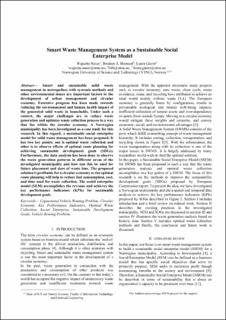| dc.contributor.author | Nasar, Wajeeha | |
| dc.contributor.author | Hameed, Ibrahim A. | |
| dc.contributor.author | Giarre, Laura | |
| dc.date.accessioned | 2021-11-01T13:18:43Z | |
| dc.date.available | 2021-11-01T13:18:43Z | |
| dc.date.created | 2021-08-26T15:12:26Z | |
| dc.date.issued | 2021 | |
| dc.identifier.isbn | 978-0-7381-1098-1 | |
| dc.identifier.uri | https://hdl.handle.net/11250/2826922 | |
| dc.description.abstract | Smart and sustainable solid waste management in metropolises with systemic methods and other environmental issues are important factors in the development of urban management and circular economy. Extensive progress has been made towards reducing the environmental and human health impact of the generated solid waste in households. Under such a context, the major challenges are to reduce waste generation and optimize waste collection process in a way that lies within the circular economy. A Norwegian municipality has been investigated as a case study for this research. In this regard, a sustainable social enterprise model for solid waste management has been proposed. It has two key points; one is optimal waste collection and other is to observe effects of optimal route planning for achieving sustainable development goals (SDGs). Furthermore, the data analysis has been done to observe the waste generation patterns in different areas of the investigated municipality and how can this be used for future placement and sizes of waste bins. The proposed solution is profitable for a circular economy as the optimal route planning will help to reduce fuel consumption, cost, and time used for waste collection. The social enterprise model (SEM) accomplishes the revenue and achieves the key performance indicators (KPIs) for sustainable development goals. | en_US |
| dc.language.iso | eng | en_US |
| dc.publisher | Institute of Electrical and Electronics Engineers (IEEE) | en_US |
| dc.relation.ispartof | Proceeding of IEEE 2021 29th Mediterranean Conference on Control and Automation (MED) | |
| dc.title | Smart Waste Management System as a Sustainable Social Enterprise Model | en_US |
| dc.type | Chapter | en_US |
| dc.description.version | acceptedVersion | en_US |
| dc.rights.holder | © IEEE. Personal use of this material is permitted. Permission from IEEE must be obtained for all other uses, in any current or future media, including reprinting/republishing this material for advertising or promotional purposes, creating new collective works, for resale or redistribution to servers or lists, or reuse of any copyrighted component of this work in other works. | en_US |
| dc.source.pagenumber | 255-260 | en_US |
| dc.identifier.doi | 10.1109/MED51440.2021.9480168 | |
| dc.identifier.cristin | 1929038 | |
| cristin.ispublished | true | |
| cristin.fulltext | original | |
| cristin.qualitycode | 1 | |
